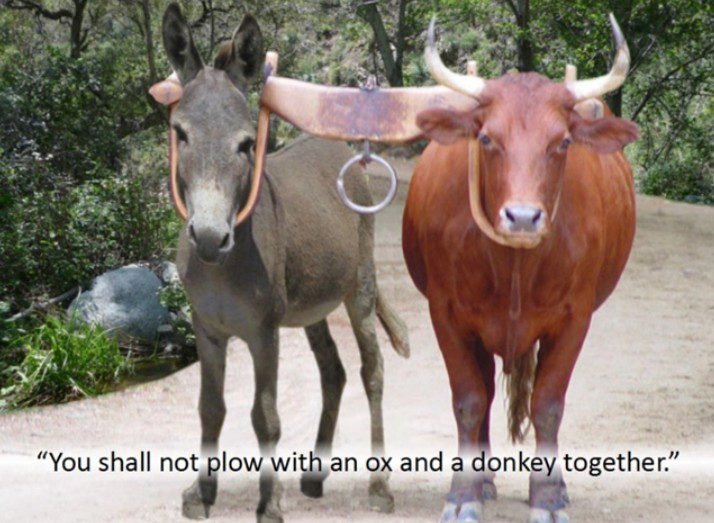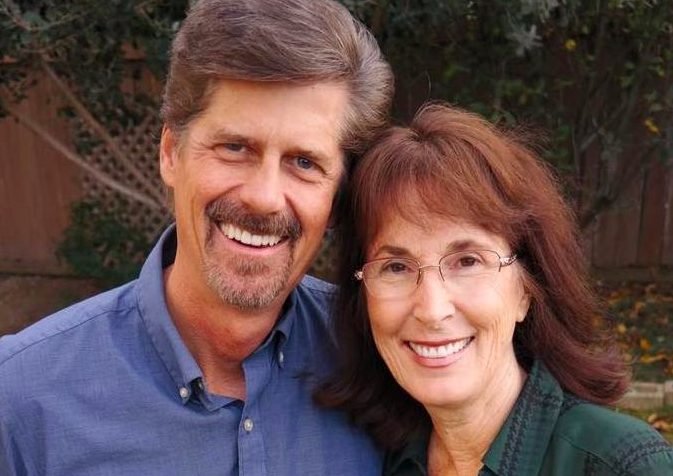
Repost from 2015. Edited, updated, and corrected.
The Bible is clear on this subject. The inspired, inerrant, infallible Word of God that millions of Evangelicals SAY they believe says:
Be ye not unequally yoked together with unbelievers: for what fellowship hath righteousness with unrighteousness? and what communion hath light with darkness? And what concord hath Christ with Belial? or what part hath he that believeth with an infidel? And what agreement hath the temple of God with idols? for ye are the temple of the living God; as God hath said, I will dwell in them, and walk in them; and I will be their God, and they shall be my people. Wherefore come out from among them, and be ye separate, saith the Lord, and touch not the unclean thing; and I will receive you. (2 Corinthians 6:14-17)
2 Corinthians 6:14-17 is not an ambiguous or hard-to-interpret passage of Scripture. It means exactly what it says. Believers (Christians, followers of Jesus) should not be unequally yoked (joined) together with unbelievers. The Bible describes marriage this way: “Therefore shall a man leave his father and his mother, and shall cleave unto his wife: and they shall be one flesh.” (Genesis 2:24)
One would think that bought-by-the-blood, Bible-believing Evangelicals would, because of their love for Jesus, obey what God has commanded. God calls on every single Christian to be just like Tim Tebow: a virgin until the day they marry a fellow believer of the OPPOSITE sex.
But, in another, all-too-typical, example of the fact that Evangelicals only believe the Bible when it fits their lifestyle and ignore it or explain it away when it doesn’t, the Christian Partner for Life website (website is no longer active) gives this advice:
Finding your husband or wife can be quite a process. Often, whether through school or elsewhere, we meet people in our lives who are not committed Christians. A common question that we receive is: “Is it OK to date someone who is not committed to Christianity?” While many advisors and ministers that we encounter have said definitively “NO,” we think it is important to have a more secular view of the situation. If you have a great connection with someone, and they would potentially want to explore raising your future family with predetermined beliefs, we see no reason to object . . .
We believe that marrying a non-Christian or a non-practicing Christian is not a definitive “no” answer, as is commonly taught. Would you rather stay single or marry a loving and wonderful person who is agnostic of Christian beliefs? If this future partner is devoted to you and has a great moral compass, we think the possibility of marriage should very much exist. If a relationship is based upon love, trust and mutual respect, there is a good chance that a marriage will succeed, regardless of religion.
The caveat to this question becomes whether your future spouse is willing to raise a family the way that you would like to. Would your future spouse be open to raising your children as committed Christians? If so, we think that a relationship could work . . .
In other words, ignore the Bible.
The Bible says that nonbelievers are dead in trespasses and sin. Unbelievers are at variance with God, vain in their imaginations, and haters of God. Unbelievers are really bad people, After all, their father is the Devil himself.
Yet, John at Christian Partner for Life says: “If this future partner is devoted to you and has a great moral compass” then perhaps it would be okay to marry them. How can unbelievers have a great moral compass? According to the Bible, they can’t.
Here’s what I think . . . unbelievers are hotter . . . and baby, when it comes to chasing after hotness, let the Bible be damned darned.
All silliness aside, John’s post at Christian Partner for Life is just another reminder that Evangelicals, for all their bluster about the Bible being truth, really don’t believe it.
Now for MY marriage advice for unbelievers.
Actually, the Bible gives some pretty good advice here. In most circumstances, it would be unwise for an unbeliever to marry an Evangelical. Unless the believer is willing to live as an unbeliever, then it is probably not a good idea to marry someone who doesn’t believe in or worship God. I can hear the howling now. Evangelicals everywhere are screaming, HOW DARE YOU EXPECT A BELIEVER TO DENY THEIR FAITH AND LIVE AS AN UNBELIEVER!! I bet it seemed okay to most Evangelicals when John proposed the very same thing when he suggested making sure the unbeliever would be willing to raise future children as believers. Evangelicals seem to always expect OTHERS to compromise so they can be true to their beliefs, but they rarely seem to be able to compromise their beliefs for the sake of others. The message is clear: my beliefs matter, yours don’t.
Generally, it is a bad idea for an unbeliever to marry an Evangelical, especially if their prospective marriage partner’s family is Evangelical too. If you marry anyway, you are sure to have conflict over issues such as:
- Baptizing or dedicating your children
- Attending church
- Tithing
- Praying over meals
- Having family devotions
- Cursing
- What entertainments to participate in
- What movies to watch
- Sex
You will also likely subject yourself to a life of “I am praying for you” and subtle attempts to win you to Jesus.
It is almost impossible for Evangelicals to NOT talk about their faith — nor should they be expected to. This is why the Bible actually gives sound advice about an unequal yoke.
Contrary to the aphorism opposites attract, successful marriages are usually built on the things that the husband and wife have in common. While my partner of almost forty-six years and I are very different people, we do have many things in common. We cultivate our common values and beliefs, and with things we differ on, we leave each other free to pursue those things alone.
Over time, the things a couple differs on can become something both like or agree upon. When Polly and I married she was a sports atheist. I was a jock. I mean, I was one of THOSE kinds of guys. I played sports year-round for the first ten years of our marriage. Age, knee problems, and a busy ministerial life finally ended my sports-playing career. Polly made a good faith effort to enter into my world. For a long time, her ignorance of sports was quite amusing, but bit by bit she became conversant in sports-talk. I did not reciprocate. I still do not know how to sew or put the toilet seat down.
We still have a lot of things that we do not hold in common, and that’s okay. But, the bedrock of our marriage of almost forty-six years is the values, beliefs, and likes we share. I believe it would be very hard for an Evangelical and an unbeliever to find common ground to build a successful marriage. It’s not impossible, but it is extremely hard.
On this issue, I am much more of a Bible believer than John at Christian Partner for Life. Granted, I see the principle taught in Scripture from an atheist perspective these days, but it still is good advice. When it comes to the foundational issues of life and the philosophies we live by, having a common mind is always best. Certainly, compromise is possible, but willingly chucking your beliefs (whatever they might be) for love will usually leave you disappointed, and it may land you in divorce court.
If you are in an unequally yoked marriage or relationship, how do you make it work? Please leave your thoughts in the comment section.
Bruce Gerencser, 68, lives in rural Northwest Ohio with his wife of 47 years. He and his wife have six grown children and sixteen grandchildren. Bruce pastored Evangelical churches for twenty-five years in Ohio, Texas, and Michigan. Bruce left the ministry in 2005, and in 2008 he left Christianity. Bruce is now a humanist and an atheist.
Your comments are welcome and appreciated. All first-time comments are moderated. Please read the commenting rules before commenting.
You can email Bruce via the Contact Form.


